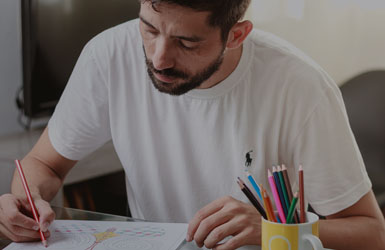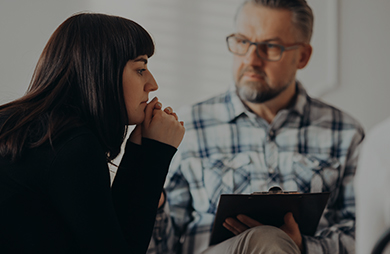Mental Health, Alcohol Drug and Gambling Addiction Treatment
We work with people who need help and their surrounding stakeholders (families, loved ones, and employers).
We work with people who need help and their surrounding stakeholders (families, loved ones, and employers).
Call and sign up for a free anonymous consultation with our specialists
Your request does not commit you to anything. We care about your safety and encrypt all personal data.
Interventions
At Back to Life, we understand the pivotal role interventions play in initiating the recovery process. Interventions are carefully planned meetings aimed at confronting a loved one about their addiction or destructive behavior. Our intervention specialists work closely with family members and friends to prepare them for this challenging conversation, ensuring it is conducted with empathy, respect, and a focus on encouraging the individual to accept help.
Services Include:
Alcoholism
Alcoholism, or Alcohol Use Disorder (AUD), is a chronic disease characterized by an inability to control alcohol consumption despite negative consequences. We offer a comprehensive range of services designed to address the physical, psychological, and social aspects of alcoholism.
Services Include:
Drug Addiction
Substance Use Disorder (SUD) involves the compulsive use of drugs despite harmful consequences. XYZ offers specialized treatment programs tailored to the unique needs of individuals struggling with drug addiction, focusing on holistic recovery and long-term success.
Services Include:
Gambling and Gaming
Gaming addiction is a behavioral disorder characterized by excessive and compulsive gaming that interferes with daily life. Back to Life offers specialized services to help individuals break free from gaming addiction and develop a healthier relationship with technology.
Services Include:
Detox
Detox is the first essential step in overcoming drug and alcohol addiction. Our medically supervised detox program ensures a safe and comfortable withdrawal process, helping you cleanse your body of harmful substances. With 24/7 care from experienced professionals, we provide a supportive environment to manage withdrawal symptoms and prepare you for the next phase of your recovery journey.
Varied Rehabilitation centers we work with are located in the best possible location in US and abroad, conducive to the best possible recover outcomes. Florida, California and even Israel.
For each participant, we create a unique rehabilitation plan tailored in intensity, richness, and combination of methods used, based on their social and economic level and situation.
Our concierge service is available at any time to answer all questions and assist with logistics, airline ticket purchases, passport renewals, and sober escort services if needed.
The rehabilitation program is developed by a team of specialists at the rehabilitation center. Thanks to a collegial approach, various treatment methods complement and enhance each other. Only experienced doctors and psychologists work with the participants. Each staff member's extensive experience allows for an individualized approach, creating a treatment program based on the participant's personality and life situation.
Besides intervention (motivation for treatment) and sober escort services, Back to Life offers a free service that connects our participants and their families with varied treatment programs and specialized services. This service helps individuals receive the care they need for mental health concerns, substance use disorders, eating disorders, chronic pain, and trauma-based behavioral challenges.
Back to Life members are trained to assess how a person’s struggles with substance use have affected their ability to experience successful treatment outcomes. We can help determine if an individual needs specialized dual diagnosis treatment for a mental health concern that is associated with addiction. We can also help participants find safe, confidential detox programs or medication-assisted treatment (MAT) to get them on the path to successful, sustained sobriety.
Some individuals achieve better health outcomes when they participate in a program that specializes in treating the mental health challenge they are struggling with. During an individual’s assessment with our members, we can determine if that person may benefit from disorder-specific treatment and recommend the most appropriate type of care for their current needs.
At Back to Life, we partner with Employee Assistance Programs (EAPs), Labor Assistance Professionals (LAPs), and Unions to provide top-tier behavioral healthcare and substance use disorder services. We collaborate closely to identify the best treatment options, offering comprehensive information and personalized guidance. Each partner is assigned a strategic account manager who develops customized program portfolios based on age, gender, symptoms, preferred treatments, location preferences, and insurance coverage.For more information, click here.
In the rehabilitation process, we draw on the expertise of leading global practices. Our specialists employ a wide range of addiction treatment methods, including depth psychology, psychotherapy, thematic group therapy, psychodrama, cognitive-behavioral therapy, existential therapy, systemic family psychotherapy, and ecotherapy (which may include thematic excursions with corrective psychotechniques, diving, and more). We also offer art therapy, including isotherapy, cinema therapy, music therapy, and additional approaches.
We guarantee professional, 24/7 assistance from our specialists—from intervention and motivation for treatment to achieving stable remission—offering continuous support to individuals with addiction while addressing all aspects of the disease.
Call or request a callback from our specialist.
We’re here to provide support and solutions.
Your request does not commit you to anything. We care about your safety and encrypt all personal data.

Experience wellness through therapeutic diving, and themed excursions enhanced with additional psychocorrection techniques such as ocean swimming, jungle walks, and more.Engage in therapeutic activities like drawing, music, and film therapy, along with storytelling based on Jungian analysis. These techniques help individuals break free from the influence of myths and see their lives as a journey toward self-discovery.

Licensed clinical social workers, therapists, and other experienced professionals provide individual therapy sessions. These sessions offer a confidential space to discuss personal concerns, set treatment and recovery goals, and receive personalized support.
Our one-on-one psychotherapy sessions provide a private setting for patients to explore various aspects of their mental state, social behavior, and personal relationships. This therapy addresses outcomes, fears, anger, and confusion, using corrective techniques to guide rehabilitation and individualized recovery.
At confidential one-on-one meetings, the psychologist and the patient work together to explore various aspects of the individual's mental state, social behavior (including interactions with loved ones, work, study, friendships, and relationships), as well as discussing outcomes, fears, anger, and confusion—situations that the patient may not feel comfortable discussing in a group setting.
At the same time, corrective therapy is utilized for the rehabilitation process and individualized directions of the recovery program are followed.

Our family therapy sessions involve loved ones in a supportive environment, helping families understand and support each other through mental health challenges. Professional staff guide these sessions to address the impact of mental illness or substance use on the family unit, promoting healing and understanding.

Psychodrama is a powerful therapeutic technique that uses guided drama and role-playing to help individuals explore personal problems and gain new insights.
By acting out events from their lives, participants can achieve emotional release, develop new perspectives, and practice new behaviors in a safe and supportive environment.
This method fosters emotional growth and helps individuals understand and process their experiences.
Benefits of Psychodrama:

Our Personalized Addiction Recovery Guidance offers daily sessions that delve into the root causes of addiction, unraveling its complex mechanisms. This program equips participants with tailored tools and immersive simulations to navigate challenging situations, avoid relapse, and make empowering choices for a brighter future.

Eye Movement Desensitization and Reprocessing (EMDR) is a psychotherapy technique designed to alleviate the distress associated with traumatic memories. This method involves the patient recalling distressing events while the therapist directs their eye movements. The process aims to help the patient process and integrate traumatic experiences, reducing their emotional impact and helping them develop healthier coping mechanisms.
Benefits of EMDR:

Led by licensed social workers, therapists, counselors, and other specialists, our group therapy sessions combine the "12 Steps" program with clinic-specific methods. These sessions analyze the root causes of destructive behavior and teach new behavioral patterns. Thematic groups focus on building stronger bonds and developing coping mechanisms.
Group therapy is provided at facilities throughout our healthcare network. Licensed clinical social workers, therapists, counselors, addiction specialists, nurses, and other experienced professionals lead group therapy sessions. During groups, you can learn about mental and behavioral health disorders and discover ways to cope with and manage their symptoms. Group sessions also provide the opportunity to connect with others who may be experiencing similar circumstances.
Group therapy is carried out by our specialists four times a day. It is based on a combination of the well-proven "12 Steps" program and a special method created in our clinic. This method involves analyzing and comprehensively studying the root causes of destructive behavior that leads to drug use. We carefully and meticulously work with thinking patterns and help implement new behavioral patterns at an automatic level.
In group sessions, we also teach specific tools and behavioral algorithms that are practiced through simulated and real-life situations. By utilizing these tools, patients avoid relapsing into the use of prohibited substances.

Our medication management services are provided by psychiatrists, nurses, and other qualified professionals. These services help manage symptoms of mental and behavioral health disorders through the use of prescription medications, ensuring that each patient receives the appropriate medical support.

Our facilities offer a variety of experiential therapies to promote the healing of the mind, body, and spirit. These therapies include mindfulness training, art therapy, music therapy, recreation therapy, movement therapy, ropes courses, animal-assisted therapy, journaling, meditation, and yoga. Led by experienced professionals, these activities enhance the overall recovery experience. Our holistic approach ensures that every individual receives the comprehensive care needed for a successful recovery, fostering a supportive environment for long-term healing and personal growth.
Call or request a callback from our specialist.
We’re here to provide support and solutions.
Your request does not commit you to anything. We care about your safety and encrypt all personal data.
Back to Life provides interventions as well as complementary treatment guidance and referrals for individuals who need personalized programming due to behavioral health and substance use concerns . As a free resource to families, licensed professionals, unions and unions labs employer groups, first responders, higher education entities, and individuals in need, Back to Life empowers clients and their families to feel confident in their treatment decisions, leading to stronger results and more positive recovery outcomes.
Behavioral health issues and addiction are life-threatening diseases, and the path to recovery can often be complex and costly. At Back to Life, we aim to simplify this journey. We offer personalized recovery services tailored to the unique circumstances of each individual and their family. With years of experience in successful inpatient rehabilitation at leading treatment centers worldwide, we have developed a program with a high success rate. Our participants achieve long-term abstinence, leading clean and sober lives filled with happiness and joy.
Our comprehensive services provide the essential resources to transition individuals from active addiction into recovery and back to a fulfilling life. We offer interventions to motivate treatment, along with placement and referrals to the best mental health facilities, detox centers, and rehabilitation centers in the U.S. and abroad. Additionally, we provide sober escort services to ensure safe travel to treatment destinations. Our robust aftercare program, which includes family therapy and support, helps sustain recovery upon returning from treatment. Each recovery program and plan is customized based on the individual's life situation and socioeconomic level, maximizing the chances for long-lasting recovery and a happy life. Our specialists work closely with participants, their families, friends, and employers, offering unwavering support throughout the entire process.

0
years helping people find freedom from addiction
0+
patients a year undergo a full course of rehabilitation in our center
0+
specialists in different parts of the world help our patients
Back to Life team can connect individuals to treatment at all levels of the care continuum depending on what best serves their current recovery goals, including:
At Back to Life, we specialize in partnering with Employee Assistance Programs (EAPs), Labor Assistance Professionals (LAPs), Labor Unions and Human Resources (HR) departments to ensure employees have access to premier behavioral healthcare and SUD services. Our dedicated approach ensures that every workforce receives personalized and effective treatment options tailored to their specific needs.
Comprehensive Collaboration
Our team collaborates closely with EAPs, LAPs, Labor Unions and HR departments to identify the most suitable treatment options for the employees they support. This partnership is grounded in our combined experience and expertise, making us a trusted source of comprehensive information and personalized guidance. We strive to create a seamless integration of services that enhances the wellbeing of employees, union members, and other workers.
Dedicated Strategic Account Managers
Each of our partner EAPs, LAPs, Labor Unions and HR departments is assigned a dedicated strategic account manager. These professionals are responsible for developing customized program portfolios that reflect the unique needs of the employees they represent. By working closely with our partners, strategic account managers ensure that the specific behavioral healthcare requirements of each workforce are met with precision and care.
Personalized Program Portfolios
Our strategic account managers develop customized program portfolios based on detailed assessments of the employees' needs. This includes:
How to Work with Us
To begin, simply call us. One of our dedicated strategic account managers will collect basic information about the individual who needs care, including the aspects mentioned above. This data will be used to develop a customized portfolio of treatment facilities that best meet the specified needs.
Comprehensive Support
Your strategic account manager will not only create a tailored treatment portfolio but will also identify the members of our team who will assist with assessments, admissions, and day-to-day support for any individuals seeking care. This ensures a smooth and supportive process from the initial consultation to the successful completion of treatment.
Contact Us
If you are an EAP, LAP, Labor Union or HR department looking to enhance the behavioral healthcare services available to your employees, contact Back to Life today. Our dedicated strategic account managers are ready to provide the guidance and support needed to ensure your workforce receives the highest quality care. By partnering with Back to Life, you gain access to a wealth of expertise and a network of premier treatment facilities, all dedicated to improving the health and wellbeing of your employees.
At Back to Life, we understand the pivotal role interventions play in initiating the recovery process. Interventions are carefully planned meetings aimed at confronting a loved one about their addiction or destructive behavior. Our intervention specialists work closely with family members and friends to prepare them for this challenging conversation, ensuring it is conducted with empathy, respect, and a focus on encouraging the individual to accept help.
Services Include:
As a free resource to families, licensed professionals, employer groups, first responders, higher education entities, and individuals in need, Back to Life empowers participants and their families to feel confident in their treatment decisions, yielding stronger results and more positive recovery outcomes.
The existing condition is already taking up a lot of your loved one’s time and causing them to miss work. Even on sober days, they can’t perform at their full potential due to feeling unwell. However, after completing a rehabilitation program, they’ll be able to reach new heights in their career and enjoy a healthy life!
As you may notice, your loved one's addiction is also costly. Over time, the expense of addressing the damage to their health will only increase. Additionally, there are other related issues—problems with work, finances, and even law enforcement. By investing in your loved one's health now, you save in the long run by avoiding the ongoing costs of managing their illness. Moreover, most problems are covered by your or your loved one's insurance.
A center away from home ensures anonymity while offering a warm coastal climate, stunning landscapes, refreshing evening breezes, and the calming sound of waves. Being removed from their usual environment allows participants to fully focus on therapy without the distractions of daily life.
Unfortunately, a person struggling with addiction often cannot critically assess their condition. This symptom, known as "anosognosia," involves denial or lack of awareness of the illness. Our specialists will begin by conducting an intervention for your loved ones, helping them to accept professional help and find their way to a healthy life.
We work 24 hours a day, without holidays and weekends
+1.917.519.3977
We will respond promptly
in a critical situation

We will support you and
your loved ones

We will answer all your
questions
Leave your contact information
and receive a free consultation with our clinical psychologist as soon as possible.
Your request does not commit you to anything. We prioritize your safety and encrypt all personal data.